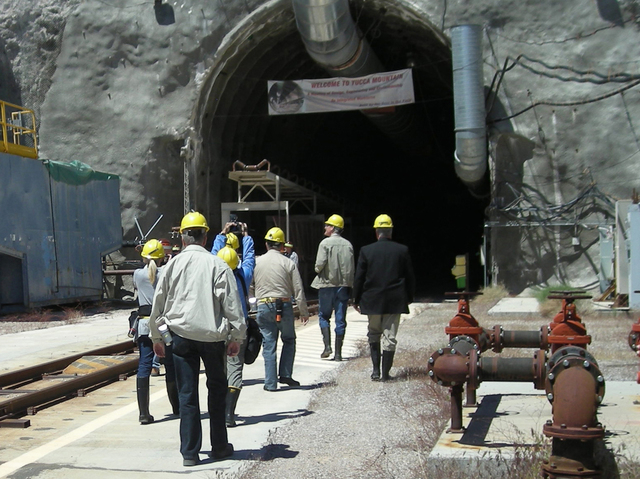
WASHINGTON — Late spring means short sleeves, schoolchildren preparing for summer vacation, and the annual push by Yucca Mountain supporters in Congress to revive the dormant nuclear waste project.
This year is no exception, as House lawmakers last week launched an energy spending bill containing $205 million for the Nevada program that President Barack Obama ended four years ago.
Until that point, the government was developing an underground repository for the waste and other highly radioactive material, over the objections of state leaders who challenged its safety.
Republicans and Democrats from states where highly radioactive spent nuclear fuel continues to accumulate at power plants say the Yucca project can end only when Congress says so.
But while that point of view has prevailed when the House has voted in recent years, the Senate is another matter. Chief foe U.S. Sen. Harry Reid, D-Nev., the Senate majority leader, maintains a blockade against any bid to resurrect Yucca Mountain as time continues to put distance between Nevada and nuclear waste.
Congress has yet to approve an alternative other than keeping nuclear waste at the power plants, stored in pools and in concrete, above-ground canisters.
U.S. Rep. Mike Simpson, R-Idaho, the chairman of the House energy and water subcommittee that included Yucca funding in its $34 billion spending bill for the upcoming fiscal year, said continued support for the project is a matter of principle.
“All we can do is what we think is right,” Simpson said. “Yucca Mountain is still the law of the land and we want the department (of energy) to proceed with a licensing application.
“We have to do what we think is right and we will see where it comes out” in conference committee where final decisions on the bill would be made. In the past few years, money the House has approved for Yucca Mountain has been excised in the Senate.
Reid said likewise the latest bid to revive Yucca Mountain “will go nowhere.”
“Republicans need to come up with a new playbook,” Reid said in a statement. “Yucca Mountain is dead and it is time for everyone to move on and develop a safe way to manage our nuclear waste.”
The House bill contains $150 million for Energy Department nuclear waste activities that Simpson said is intended to be spent mostly on Yucca.
Additionally, the bill allocates $55 million for the Nuclear Regulatory Commission to continue project licensing. The NRC is under court order to continue working on Yucca matters but only until its present funding runs out, which is expected by next year.
The bill doesn’t contain any funding for Nye County, the counties surrounding Yucca Mountain that are known as the affected units of local government, or the State of Nevada, for Yucca Mountain oversight funding.